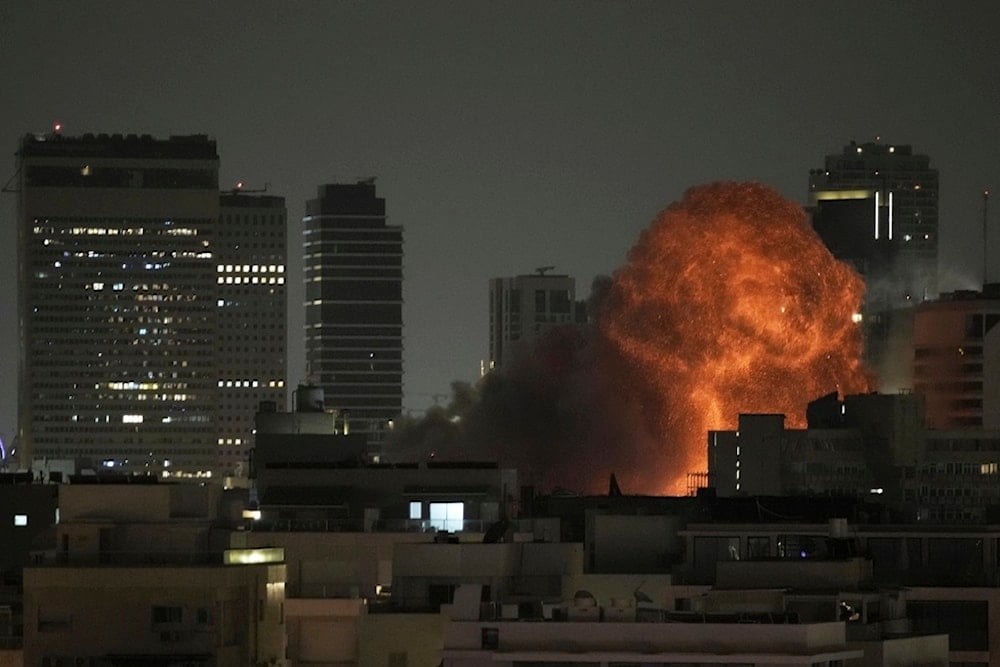Iran warns of stronger retaliation against any future aggression
Iran warns that any aggression will trigger a response stronger than the June 12-day war and asserts that the JCPOA is void.
-

A missile launched by Iranian armed forces impacts a target in Tel Aviv, central occupied Palestine, on June 15, 2025 (AP)
Iran has issued a stern warning to its adversaries, emphasizing that any act of aggression against the Islamic Republic will trigger a response far stronger than what adversaries faced during the 12-day war in June.
Major General Mohammad Pakpour, Commander of the Islamic Revolution Guards Corps (IRGC), made the remarks during a meeting with Iraqi National Security Advisor Qasim al-Araji in Tehran on Tuesday.
He stressed that Iran is fully prepared to repel any threats. Any aggression against Iran, Pakpour said, “will certainly unleash hell on them,” highlighting Tehran’s readiness to respond more forcefully than it did during the June aggression.
The Revolutionary Guards commander also warned about the danger "facing our brothers in Iraq and the wider region, noting that our American enemies and the Israeli entity are actively working to destabilize the internal unity of every nation.
Missile capabilities
The IRGC commander recalled the 12-day war, noting that the Israeli regime had placed great reliance on its missile defense systems.
The Americans deployed several THAAD and Aegis systems at sea and in neighboring countries to prevent Iranian missile launches, Pakpour stated, noting that despite these measures, Iran successfully launched its missiles and struck multiple targets.
On June 13, the Israeli regime, backed by the United States, launched an unprovoked war targeting Iranian military, nuclear, and residential areas. The US escalated the war on June 22 by striking three Iranian nuclear sites in Natanz, Fordow, and Isfahan.
In response, the IRGC Aerospace Force carried out 22 waves of retaliatory missile strikes under Operation True Promise III, inflicting significant damage and losses across Israeli-occupied territories and in the American-operated air base of Al-Udeid in Qatar.
Read more: Iran's underground missile cities, stockpiles unscathed: IRGC
Government preparedness and deterrence
Parallel to Pakpour's statements, Iranian Vice President Mohammad Reza Aref echoed the IRGC’s warnings, emphasizing that Iran’s Armed Forces are fully prepared for both routine and exceptional scenarios.
“If the enemy takes any act of mischief again, we have plans for that situation and are fully prepared. The Armed Forces will deal an even harsher slap to the enemy,” Aref underlined
“We have prepared the necessary plans and are not worried about any mistake by the enemy,” Aref added.
Read more: Iran Leader derides Trump over claim of destroying nuclear industry
Void JCPOA, snapback
Aref also addressed the recent activation of the snapback mechanism by the E3, describing the action as lacking a legal and juridical basis. He noted that Iran had already issued ultimatums in 2016 and 2017, warning that failure to uphold the Joint Comprehensive Plan of Action (JCPOA) would result in suspension of Iran’s commitments.
Tehran remains unperturbed by these measures, according to Aref. While acknowledging the impact of sanctions, he emphasized that their effects must be mitigated through internal strategies and effective domestic management.
Iran has already passed the stage of circumventing sanctions, Aref concluded, underlining the country’s resilience and strategic readiness.
Read more: Iran clarifies stance as Res. 2231 expires, says nuclear rights intact

 3 Min Read
3 Min Read








